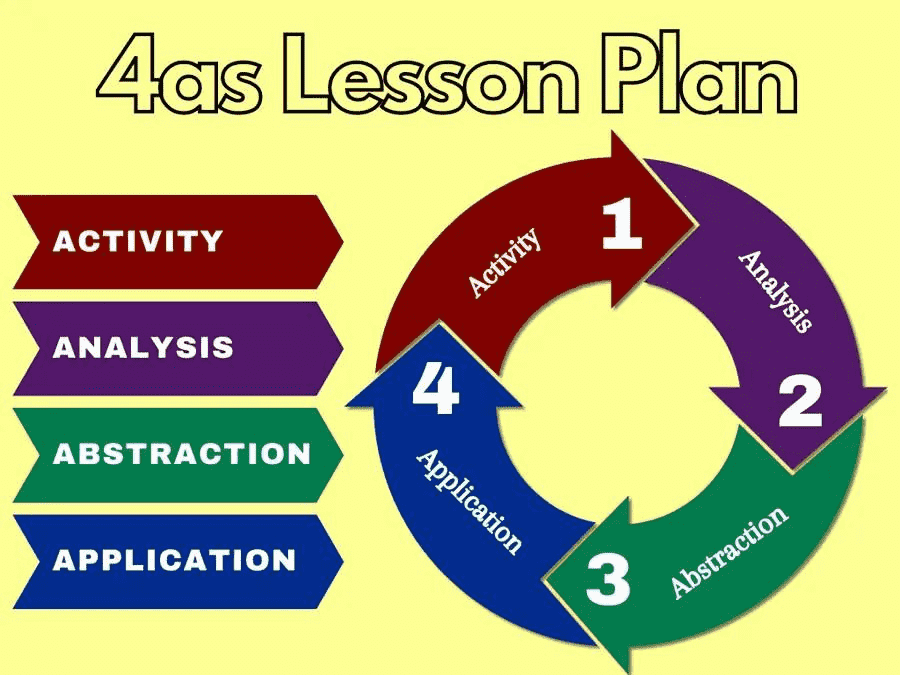
What are the 4 A’s of lesson planning?
There are many theoretical frameworks that have been researched and developed to help teacher complete their own lesson plans, and the 4 A’s of lesson planning is one of them.

The role of lesson planning
Lesson planning is like a powerful right hand to bring teachers’ valuable knowledge to today’s students. Because it will be a solid premise that teachers closely follow to monitor their students’ levels after each lesson. Therefore, teachers should focus on preparing lesson plans to find ways to convey in a simple, approachable, and easy-to-understand way.
In short, lesson planning ensures that students enjoy the best possible learning experience.
Read more: What Are the 3 P’s of Differentiation? A Complete Guide [2025]
What are the 4 A’s of lesson planning?
The 4 A’s of lesson planning based on the Experiential Learning Theory proposal by David Kolb is a popular framework used by many teachers, primarily focusing on solving student problems. The phrase 4 A’s stands for: Activity, Analysis, Abstraction, and Application.

Activity
Through interesting activities, teachers can create a sense of curiosity and stimulate students’ interest in a certain topic based on existing knowledge.
For example, start an English lesson by playing music, and arouse your passion for music. Then, lead the story so they can describe those songs with adjectives, adverbs, or noun phrases.
Analysis
This is the stage where teachers analyze, classify, and simplify information for students to dig deeper into the lesson. This process stimulates the student’s brain to begin operating and converting that information into knowledge imprinted in his or her mind.
For example, instead of using the term ”demographics” for new students without analysis, teachers can say that it is the necessary basic information of a subject such as age, gender, and job.
Abstraction
At this stage, students receive information and understand the content in their own words. Through open-ended questions, teachers help students connect their relevance to real life. Furthermore, applying it to current life creates intimacy and is easily engraved in students’ memories.
For example, concepts in Physics can be applied to explain natural phenomena such as magnetic fields, water vapor condensation, or rain. Perhaps the students will feel very interested and appear excited about this class.
Application
Encourage students to apply what they learn to solve problems and transfer knowledge to real-life situations. For example, calculate the speed a car can travel in 1 hour at 50km/h.
Read more: 14 Types of teaching methods for an effective lesson
Some criteria to evaluate teachers’ lesson planning

Each educational system in different countries will have its own assessment and level of evaluation for each teacher’s lesson plan. However, most of them want the best learning environment for students with lesson plans that include the following criteria:
- Innovative teaching methods, teaching techniques, and assessment
- Ensure enough time, avoid applying forms and templates
- Develop many learning activities with specific goals, content, and learning products that students must complete
- Focus on fully promoting thinking and creative abilities
Explore More: “What Are Your Salary Expectations?” – 10 Sample Answer
FAQs
What is the 5 model of lesson plan?
The teaching lesson planning model offers different approaches from structure to lesson design to its content. Refer to the 5 models below:
- Madeline Hunter Model
- 5E Instructional Model
- Understanding by Design (UbD) Model
- ADDIE Model
- Backward Design Model
What makes a good lesson plan?
With these aspects, teachers can create a good and effective lesson plan that caters to both the subject matter and the learners’ needs:
- Theoretical basis: involves reference materials, teacher guides, knowledge and skill standards, and curriculum guidelines.
- Classroom resources: equipment like projectors, computers, audio systems, interactive boards, and other teaching aids.
- Lesson specifics: each lesson has unique characteristics and content that need to be developed appropriately.
- Student factors: consider the student’s current knowledge level and their ability to grasp and retain new information.
What are the 4 steps of lesson planning?
If teachers want to complete quality lesson planning, they also need a roadmap and 4 steps to follow:
- Step 1: Determine specific teaching goals and learning object
- Step 2: Prepare documents
- Step 3: Determine teaching methods
- Step 4: Plan the lesson
Read more: How To Write a Lesson Plan in 6 Steps: The Complete Guide
Based on the 4As of lesson planning, teachers can design transformative learning curriculums that engage students and ignite a passion for learning by raising awareness of students’ learning needs and goals. Also, incorporate activities and assessments, make learning relevant and authentic, and use successful assessment strategies.
Please see VTJ latest articles to update more good information about education.






